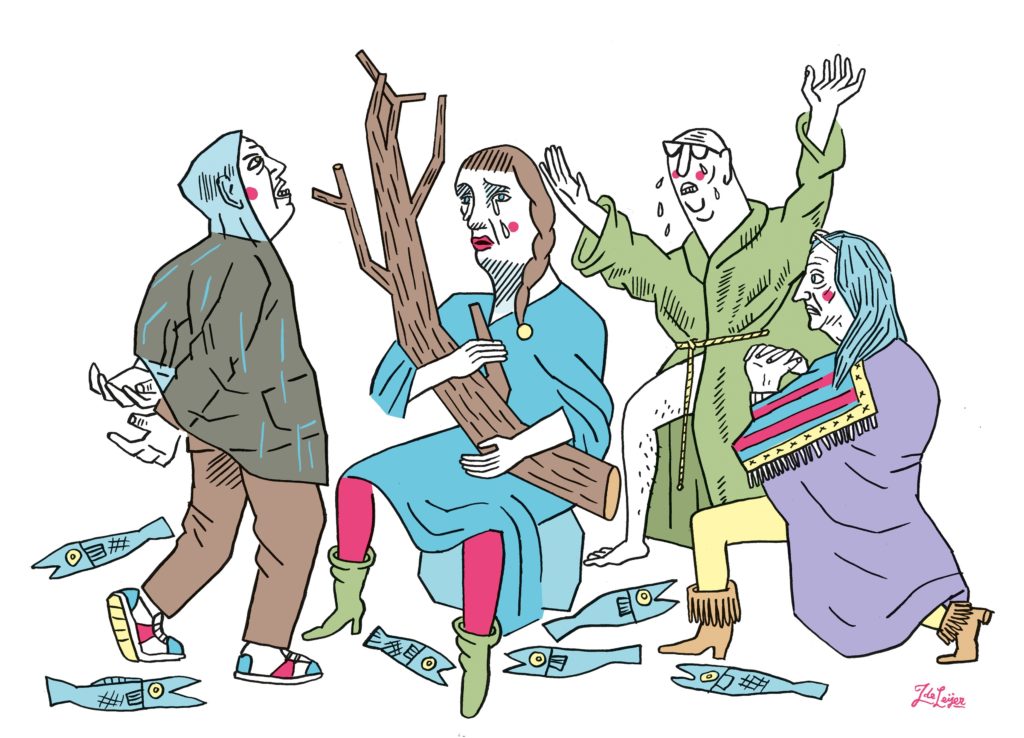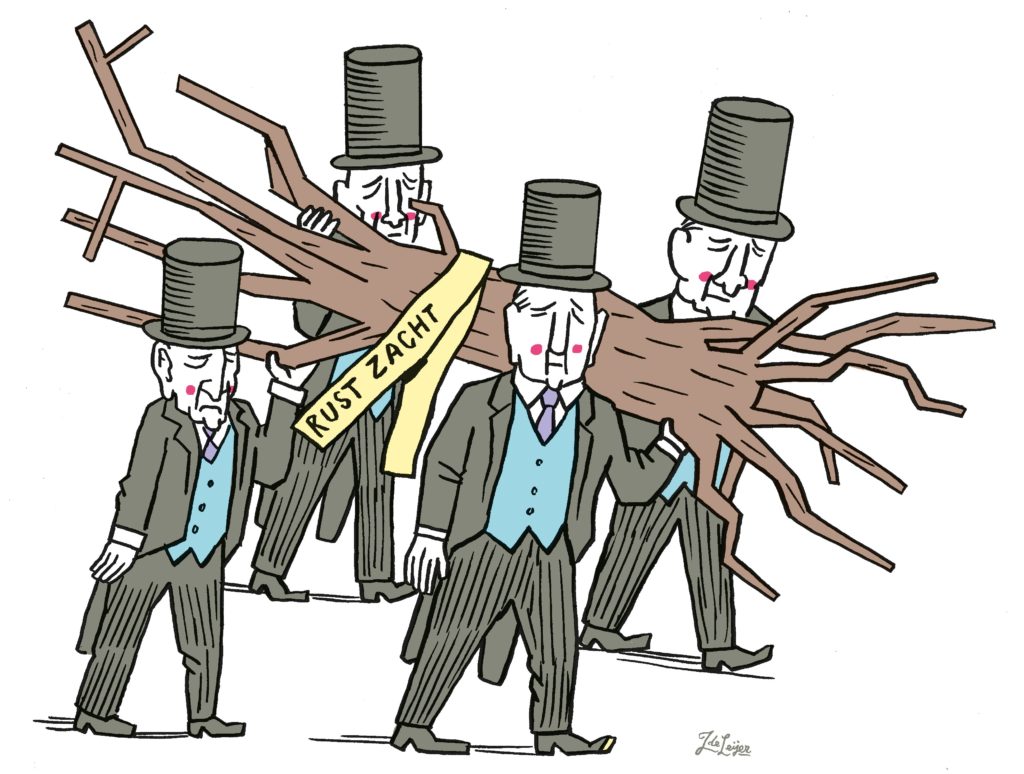Grieving for nature: sounds crazy, but it helps
For younger generations, the climate crisis has been lurking all their lives: threatening, overwhelming, and often invisible. Time is running out, the climate crisis is growing and the pressure on us is increasing. But what does this actually do to our emotions and what do those emotions mean for our behavior? Does the climate crisis paralyze us or, on the contrary, make us more combative?

When I ask peers how they feel when confronted with the climate crisis, I get mixed responses. Feelings such as anger, powerlessness, fear, guilt, cynicism, and despondency are all discussed. People talk about the power of large corporations, about excessive consumerism, and about ominous weather changes.
Recent research (in Dutch) by Energie Beheer Nederland shows that a large majority of young people in the Netherlands (80%) are concerned about the climate and the living environment. This percentage is also high in other countries, according to research by psychotherapist and researcher Caroline Hickman.
Despite these high percentages, relatively little attention is paid in the climate debate to the feelings that climate disruption evokes. Yet these emotions are far from unimportant, philosophers and psychologists show. “Emotions, in addition to physical reactions, are ways of looking at the world,” says TiU lecturer and philosopher Pilar-Lopez. “Emotions partly determine how we perceive the world and the people around us.”
From shame to action
Look at grief, for example. Grief unlocks the relationship we have with another person—or with nature. Grieving for nature may sound crazy, but philosophy frequently elaborates on this. “Grief is mostly considered the emotion linked to loss,” says Lopez-Cantero. Ecological grief is a reaction to environmental degradation, with the underlying idea that non-human life is “grievable.”
For example, we can grief over the extinction of animal species or the loss of large areas of rainforest. Moreover, we can grief over an anticipated loss, as when we imagine a future with warmer Dutch winters that mean the loss of the Elfstedentocht. According to Lopez-Cantero, some philosophers argue that grief is a motive for action.
This also applies to feelings of shame. Shame presents itself when you feel that you are not taking enough action, Lopez-Cantero explains. For example, you may feel ashamed for not separating your trash or for not voting for a green party. Some philosophers think that shame paralyzes, but others think that shame—like grief—spurs action. Shame can contribute to a person’s introspection, Lopez-Cantero explains. In fact, based on feelings of shame, you can ask yourself: what kind of person do I want to be and what values am I striving for?
Eco-emotions
Not only grief and shame possess the ability to spur action and change. “If you let the climate crisis get to you, many different feelings can present themselves,” says climate psychologist and co-founder of online platform ‘Klimaatpsychologie.com’ Sara Helmink. Helmink prefers to use the umbrella term “eco-emotions” and lists some examples: fear, anger, despair, hope, despondency, sadness.
The bright side of all the emotions mentioned, Helmink explains, is that they can serve as a motor for change. In her practice, Helmink regularly uses the slogan “in your pain you will find your values.” This comes from the ACT therapy (Acceptance and Commitment Therapy), a form of behavioral therapy that Helmink says fits very well with the climate crisis. “When you are touched by something or when something upsets you, that says something about you and about your values,” Helmink says. When we embrace those emotions with compassion, they can serve as a driving force for so-called “value-based behavior.”
Helmink explains that even feelings typically associated with apathy, such as depression and powerlessness, can contribute to value-based behavior from ACT therapy. Discussing and normalizing such feelings, can counteract apathy and paralysis.

In thinking and speaking about eco-emotions, it is important not to lose sight of the collective nature of the climate crisis. Helmink explains that using a term like “climate depression”—although it opens up the conversation—pathologizes and puts a lot of emphasis on the individual, while the climate crisis is a collective problem. In addition, an individualistic approach to the climate crisis encourages feelings of powerlessness. After all, as an individual you feel like a drop in the ocean. That individual bubble is broken when you start talking to other people, Helmink says.
Negative schedules
The crisis affects us all, but everyone reacts differently. Emotional reactions regarding the climate crisis have partly to do with one’s personal background, says philosopher and psychologist Christof Abspoel. Abspoel is affiliated with the platform ‘Klimaatpsychologie.com’ and works as a treating psychologist in mental healthcare. To illustrate the foregoing, Abspoel gives the example of someone who, in the family, used to be taught to eliminate him/herself.
When confronted with the climate crisis later in life, she reacts from a self-sacrificing position. Her first reaction is, “I’m not allowed to have any more children. She thinks she has to give up her desire to have children, while having children is her greatest wish. Therein lies a risk of nihilism, Abspoel believes. “I think it’s very dangerous if we start feeling guilty for creating, because otherwise we lose touch with what it means to be human,” Abspoel says.
According to Abspoel, it is striking that this person—initially—fails to look at the situation more flexibly and weigh other options to shape her commitment to the climate. “By that lack of flexibility, you recognize that a ‘schema’ is active,” says Abspoel. A ‘schema’ is a term from psychology and refers to a set of thoughts, feelings; things you physically feel and tendencies you have. Self-sacrifice, guilt, and powerlessness are examples of schemas that are “switched on” inside us because of the climate crisis, Abspoel further explains. So, a schema can be very overwhelming and defining.
Not the only one worried
The above example is just one of countless possible responses to the climate crisis. That variety of reactions sometimes evokes cynicism: a lack of confidence in other people’s climate awareness. However, it is a fallacy to think that others consider the climate less important, according to a study Helmink refers to. That study reveals that individuals structurally underestimate the biospheric values of others. Helmink sees this reflected in her therapy and emphasizes that it is therefore good to talk to others, so that you experience that you are not alone and that others are also concerned.
Because of the magnitude, complexity and uncertainty of the climate crisis, it can be difficult to look to the future with hope. But even when we have little or no reason to hope, we can still hold out hope, according to Lopez-Cantero. She refers to philosopher Katie Stockdale in this regard. Stockdale describes hope as the combination of a desire for an outcome and the belief that the outcome is possible but not certain. If we hold on to the belief that our actions might make a difference, we are more likely to actually take action. If we give in to despair, the battle is lost in advance.
Healthy amount of worry
We humans regularly make the fundamental fallacy that we are in control of the world, Abspoel explains, but we are not. Hope, then, can be described as, “acting in the knowledge that you don’t know the future and therefore things can also turn out well.” We do not know the future and we have no guarantee that things will turn out well. However, we also do not have a guarantee that things will not turn out well, and that is reason enough to do our best.
The climate crisis evokes numerous emotions and causes much concern. This can sometimes be unpleasant, but we also need this concern if we want to strive for a better future. A healthy amount of concern about the climate may not make us combative immediately, but it does make us more critical of the way we treat the earth. Regardless of what the future looks like, we can learn from this crisis. About ourselves, about our values and behavior, and about our relationship with nature.
Translated by Language Center, Riet Bettonviel






